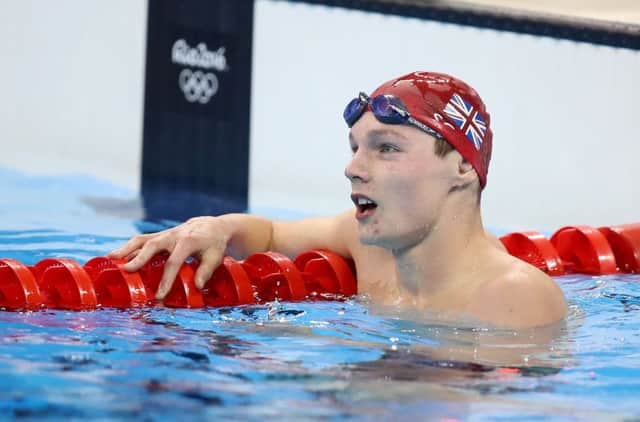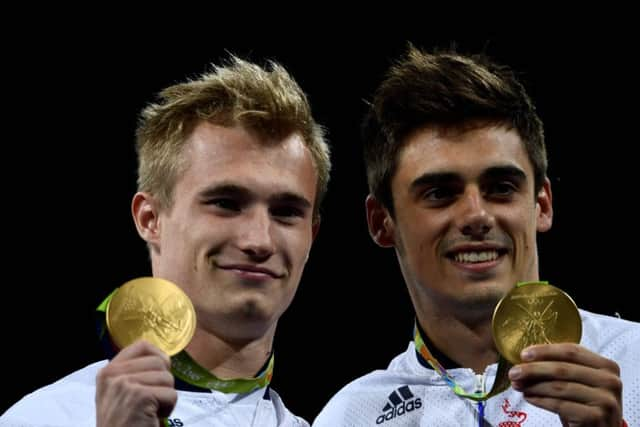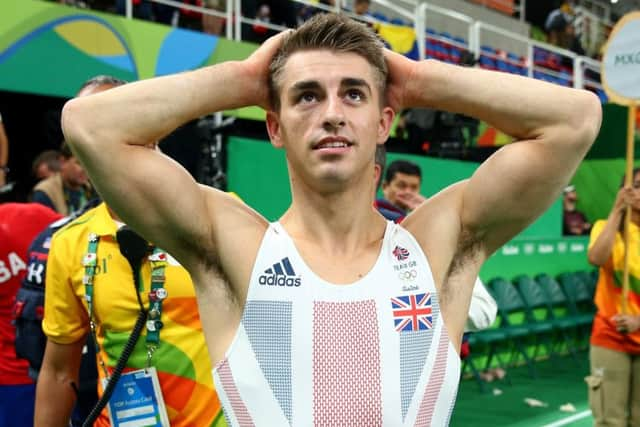Duncan Scott a fine fifth, Dan Wallace into medley final


Almost 24 hours after he was part of the British quartet that won silver in the 4x200m freestyle final, the 19-year-old Scott equalled the British record of 48.01 he set in the heats to finish fifth, with 18-year-old Australian Kyle Chalmers winning a very close race.
“I am delighted with that,” Scott told the BBC. “I was happy to make the semi-final and to be in that final was incredible. Hopefully things can move on next year.
Advertisement
Hide AdAdvertisement
Hide Ad“Everyone in the GB team is swimming with confidence at the moment. We have the best breaststroker ever and the whole team wants to keep swimming.”


Scott will now focus on his potentially crucial anchor leg in the 4x100m medley relay that will finish the Olympic meet in the early hours of Sunday.
Scotland’s Dan Wallace, one of Scott’s relay team-mates, continued to justify his wildcard selection as he made the final of the 200m individual medley with the fifth-fastest time.
Wallace went in the same semi-final as legend Michael Phelps, who looks set to take another Olympic gold - his 22nd after qualifying fastest ahead of American team-mate Ryan Lochte.
Britain will have two finalists in the women’s 200m breaststroke after Molly Renshaw and Chloe Tutton both came through their semi-finals.


Renshaw was the third fastest qualifier in a new British record of 2:22.33, claiming the mark back from Tutton by just 0.01.
Great Britain’s Andrew Willis missed out on a medal in the 200 metres breaststroke by an agonising eight hundredths of a second.
The 25-year-old went into the final as the second-fastest qualifier behind Japan’s Ippei Watanabe and was gaining with every stroke coming down the final length.
Advertisement
Hide AdAdvertisement
Hide AdBut he was touched out, with Kazakhstan’s Dmitriy Balandin winning gold ahead of Josh Prenot of the United States and Russia’s Anton Chupkov.


Willis’ time of two minutes 07.78 seconds in fourth was just 0.05 seconds behind the personal best he set in the semi-finals on Tuesday, which had raised hopes of a fifth British swimming medal.
Mears the merrier
Chris Mears reflected on his near-death experience after winning Olympic gold with best friend Jack Laugher.
The pair won Britain’s first Olympic diving gold medal with victory in the men’s synchronised three-metres springboard final as Team GB enjoyed a wonderful Wednesday to truly kickstart their Games with a haul of two golds, two silvers and four bronzes.


It was a particularly emotional victory for Mears, the 23-year-old from Reading who had life-saving surgery to remove a spleen ruptured while diving in 2009.
“I still can’t really believe that it’s happened,” Mears said.
“I’ve come from death’s door to here. I’m pretty proud.”
Proving the British diving team is about more than one man, the City of Leeds pair joined Tom Daley and Dan Goodfellow as medallists. And further success could follow before the end of the Games.
Mears and Laugher finished ahead of the United States’ Sam Dorman and Mike Hixon in second and China’s Cao Yuan and Qin Kai in bronze.
“It’s fantastic for us,” said Laugher, who shed some tears.
Advertisement
Hide AdAdvertisement
Hide Ad“We’re so overwhelmed with what we’ve done. The dream has happened and it’s paid off.”
Mears added: “I can’t imagine what it would be like to get an individual gold, to do it with my mate is incredible.”
Mears was fifth alongside Nick Robinson-Baker at London 2012, just three years after his accident, which happened in Australia and left medical professionals giving him a five per cent chance of survival.
“When I went into London and competed really well there, that was really emotional for me, because of what had happened to me,” Mears added.
“London changed me as a person. I became a bit more mature.”
Mears and Laugher teamed up in 2014 and won Commonwealth gold. World bronze followed last year and European gold was claimed in May before the Olympic title here.
It was their first win on the global stage, in World Cups, World Championships or Olympics.
China had won all three of the prior events at the Maria Lenk Aquatics Centre, where the diving pool was still green and the adjacent water polo pool appeared to be growing greener, too.
Advertisement
Hide AdAdvertisement
Hide AdDaley and Goodfellow took bronze in the 10m synchronised platform event in a new partnership, but Mears and Laugher have pedigree together.
The British pair, who are housemates in Leeds, led at the halfway point of the competition, which took place in typically British conditions. It was cold and raining.
“We enjoy it,” Laugher said.
“We took on the English weather, with the wind and the rain. We embraced it and we’ve come out with the medal, so we’re really happy.”
They enhanced their advantage by scoring 85.68 for their inward three-and-a-half somersaults with tuck.
A score of 86.58 for their forward two-and-a-half somersault with three twists - the most difficult dive in their repertoire - saw the Britons take an advantage of 2.64 into the final round.
They are the first pair to perform the dive in synchronised competition and Mears joked it should be called ‘the washing machine’.
With the USA nine points adrift in third, it appeared to be a two-way battle for gold, coming down to the final dive.
There was a delay as Mexico wanted a re-dive, but were denied, after claiming to be distracted by additional floodlights coming on.
Advertisement
Hide AdAdvertisement
Hide AdThe USA then responded to score 98.04 with their final dive, reaching 450.21 and piling the pressure on Britain in a tense podium battle.
“I recognised they’d done a really sick front, they’d nailed it,” Mears said.
“We just stayed in our zone.”
Mears and Laugher kept their composure, scoring 91.20 for their forward 4 1/2 somersault with tuck, to take them to a total of 454.32.
China needed better than 93.84 to win. Laugher and Mears were powerless; they could only watch.
But China faltered, scoring 83.22, which sparked jubilant celebrations among the full British contingent.
Mears said: “We’re such a close team, it’s fantastic to share that moment.”
Laugher finished a lowly 27th in the individual event four years ago, but the 21-year-old from Harrogate has a good medal opportunity when it begins on Monday.
Asked what he would think if he emerged with a second gold, Laugher said: “That’s ridiculous. Just to come away with one doesn’t seem real. I haven’t got my head around it yet.”.
Max power
Advertisement
Hide AdAdvertisement
Hide AdMax Whitlock bowed to the greatness of Kohei Uchimura after becoming the first British gymnast to win an Olympic all-around medal in 108 years.
The 23-year-old took bronze behind the all-conquering Japanese superstar, who retained his title and extended his eight-year winning streak after edging past Ukraine’s Oleg Verniaiev on the final piece of apparatus.
For Whitlock, who had won bronze medals in the team and pommel horse competitions at London 2012, a podium finish in the most prestigious of gymnastics disciplines proved the culmination of his rise to the top of his sport.
Whitlock said: “The all-around is obviously the toughest event because you’ve got to get all six apparatus right, and it is something my coach and I have been working very hard on since London 2012.
“I wanted to prove myself as an all-rounder and I’ve fulfilled that, and I feel complete in that target. There was a lot of pressure and it became very tense towards the end.”
No athlete encapsulates the excellence of the all-around discipline than Uchimura, who has been untouchable since taking silver in Beijing in 2008, yet against whom Whitlock was desperate to mount a challenge.
The duo, along with surprise challenger Verniaiev, swapped positions throughout before the top two pulled away, leaving Whitlock to endure a nervous final rotation watching China’s Chaopin Lin and Nikolai Kuksenkov of Russia narrowly fail to snatch third place.
Ultimately, Whitlock’s place on the podium was secured before Uchimura produced a flawless performance on the high bar which proved enough to usurp Verniaiev, the long-time leader of the competition, who paid the price for opting for a safer routine.
Advertisement
Hide AdAdvertisement
Hide AdWhitlock, who had to bounce back from the disappointment of missing out on a team medal on Monday, added: “Uchimura has been my idol for a long time and I feel so proud to be mentioned alongside him and Oleg. He produced an amazing high bar routine on that last piece and that is one reason he’s my idol, with the amount of pressure he was under.”
Whitlock had the luxury of opening the final on his favoured pommel horse, where he is widely expected to go head to head with his Great Britain team-mate Louis Smith for gold in one of the two individual finals, along with floor, he will contest early next week.
Despite scoring marginally lower than his ranking for the team final, Whitlock fashioned a slight lead which was soon overhauled by Uchimura, but at the half-way stage it was 2014 parallel bars champion Verniaiev who had moved ahead.
A lower parallel bars score left Whitlock looking behind him to defend bronze, and a minor mistake on the floor led to some anxious moments before the judges finally confirmed he had done enough to secure bronze.
“It wasn’t so much nerves, but I made a slight mistake on the floor before I managed to recover it,” added Whitlock. “It made it much more tense before the end as I had to wait a whole rotation while people came through with good scores.
“I never knew where I was placing at all. I didn’t know any of the scores of any of the other gymnasts at any point. It wasn’t until the end when I was first up so I could then watch everyone, and it was really tough.
“To get all six pieces right is a very tough job and there was a lot of pressure going into today, but I had to take it step by step. Before I competed I just said ‘I’ve got to go for it’, and that’s what I did.”
Whitlock and Smith will be joined in the individual finals by Leeds 20-year-old Nile Wilson, who finished in an admirable eighth place after ending his rotations with a dramatic high bar routine.
Advertisement
Hide AdAdvertisement
Hide AdWilson, who will return to bid for a medal on that same piece of apparatus, said: “I’m so happy for Max to get the bronze because he is a massive inspiration for me - I’ve looked up to him for years.
“I said to him at the end that four years from now I’m going to be doing what he’s doing.
“It’s the third time I’ve been in there this week. I just love every second of it and I just focus on the process of the competition and my routines. I just want to show the world what I am capable of.”